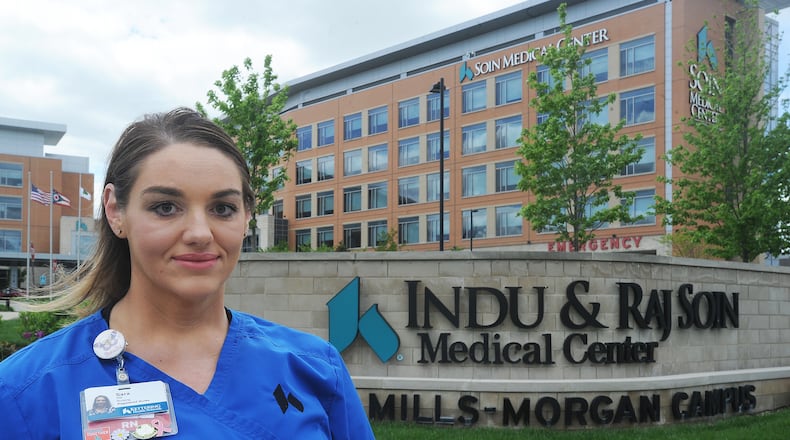They are two of more than 11,000 registered nurses in the Dayton area that will be celebrated during National Nurses Week, which starts today. The Dayton Daily News interviewed several nurses about their careers and their experiences this past year.
“Our nurses really serve the role as not only caregiver but advocate, educator, and, even more so this last year, have really stepped into the role of being the family for our patients,” said Jenn Shull, chief nursing officer at Kettering Health Network. “Last year, we had very limited visitation, and our patients were not able to connect with their loved ones like they typically do when in the hospital, so our nurses really served not only to give physical care, but emotional support as well.”
Nursing is a profession where the job can be under strain, including before the pandemic even started.
Among critical care nurses specifically, a recently published survey of 771 critical care nurses by Ohio State University College of Nursing found they experienced higher rates of mental distress and poor health than other nurses, adversely affecting health care quality and safety. The survey was from August 2018 to 2019.
Shull said this year it’s especially important to be intentional in recognizing and appreciating nurses, because they not only were caring for patients sick from the pandemic, but they were also navigating some of these challenges themselves, with sometimes they or their family members getting sick.
“It’s also thanking them and acknowledging that they too had personal challenges this year and despite that they show up to work every day to deliver some amazing care,” she said.
Sara Dulaney
Sara Dulaney started out two years ago at Soin Medical Center working on a cardiac floor, but when the pandemic hit and hospitals started converting space to COVID units, her unit was converted.
She said they were always adapting and learning new treatments and she was glad to be able to help people.
With COVID patients, she said they would have longer lengths of stay than patients who were in for normal cardiac procedures she had seen.
“We pray with them a lot more. We help them spiritually, because we were all that they had sometimes with the visitor restrictions,” she said. “We spent days with them and sometimes weeks with them, so you really get to know people and their families.”
Dulaney recently received the Daisy Award, given for patient care. In a nomination by the daughter of a patient Dulaney cared for, she wrote Dulaney “gained the trust of an otherwise ‘leery and anxious’ man who does not spend a lot of time on his own health and wellbeing. She kept in contact with me and even offered her prayers for my dad and for my family.”
While it’s National Nurses Week, Dulaney, who started working in the lab before she switched to nursing, said she wanted to emphasize that patient care takes a whole team of not just nurses, but doctors, lab, social work, leadership, and more.
“It takes literally an entire team to help them heal,” she said.
Steven Bower
Credit: Will Jones
Credit: Will Jones
Bower, nurse manager at Miami Valley Hospital South’s emergency department, said last year for nurses anxiety was high, especially early in the pandemic.
“We didn’t know a lot about COVID from the beginning,” Bower said.
Bower, who is a commissioned officer in the Army Nurse Corps of the Ohio Army National Guard, said his career started out fresh out of high school when he shipped off to basic training and became a combat medic and was exposed to the army’s trauma experts. He’s been with Premier for 16 years and at Miami Valley South for about 10.
This year, Bower said there were longer days for him than normal and he worked to be there emotionally for staff and to help nurses feel safe. People were worried about contracting COVID or taking it home to their families.
“There were definitely a lot of panicky episodes where the stress was just overcoming and the emotional states were high, so just trying to keep them going was a big task,” Bower said. “But, I’m very fortunate to have a group of nurses that are outstanding and they lean on each other like family.”
During Nurses’ Week last year, Bower decided in his time off to drive around to drop off appreciation gifts to his nearly 60 staff members’ homes.
“In health care, everything that nurses do is examined and measured and it’s a really tough job sometimes ... So I really wanted to make them feel appreciated,” Bower said.
Marquetta Colbert
Credit: Courtesy
Credit: Courtesy
Nurse practitioner and owner of Colbert Family Health and Wellness in Trotwood, Marquetta Colbert, always knew she wanted to be a nurse. When she was younger she would take care of her family members and at 16 she volunteered at Miami Valley Hospital.
“Being a nurse has changed my life completely because I was able to find what I was supposed to do in life at a very young age,” she said.
She went to Sinclair Community College for nursing when she was 18 and worked as a nursing assistant in a nursing home. The Dayton native became a registered nurse in her mid-20′s. She worked as a nurse in the intensive care unit at both Grandview and Miami Valley hospitals.
Colbert said a personal health condition is what jumpstarted the second phase of her nursing career. In her late 20s she was diagnosed with thyroid cancer. “There were some gaps in the healthcare system that I felt that I saw with my own diagnosis,” she said. “The specialist thought I wanted pain medication and I wasn’t having pain. I was having problems sleeping.”
Around this time, she had started thinking about ways she could help other people even more than what she doing in ICU.
“If I’m married, I have good insurance, I’m a nurse and I have medical knowledge and a healthcare professional could misinterpret my need, imagine how it would be for someone who doesn’t have good health insurance, social support, economically challenged caught up in the medical system to be misunderstood or not get good medical care,” she said.
In 2010 she opened her own primary care office, the Colbert Family Health and Wellness, and during the pandemic the health center performed COVID-19 testing for patients.
Colbert said the pandemic put a strain on the primary health sector since more people were staying inside and practicing social distancing and handwashing, the facilities started to get less acute care visits for things like colds and strep throat. However, working during the pandemic for her and other nurses was extremely difficult.
“Working as a nurse during the pandemic was one of the most gratifying but also the most scariest time that any nurse can experience,” she said. “The gratifying part of it because you’re taking care of others, but the low was you were scared for your own life and that safety of your family because of the profession that you chose.”
Colbert said nursing changed her life and has allowed for her to mentor young nurses and even girls in high school interested in nursing. “I’ve been able to be an example and show them how they can become nurses,” she said. She also offers a yearly scholarship, Colbert Family Health Scholarship Fund, for high school students from Dayton Public Schools that want to be a nurses.
When she isn’t working, she enjoys reading and sharing book titles with her two daughters and shopping for herself and her family members.
Melissa Thiegart
New Carlisle native and registered nurse, Thiegart, works at Grafton Oaks Rehabilitation and Nursing Center in Dayton as the minimal data set coordinator where she takes care of residents, develops care plans, perform patient assessments and make recommendations.
Her nursing career started in 1980 when she worked in long-term care. In 1989 she graduated from Community Hospital School of Nursing.
“I started as a nursing assistant because that was the only job I could get at the time and I fell in love with it. Just getting close to the residents and being there for the residents that didn’t have family and trying to give them a good quality of life while they were at the facility,” she said.
Working at the nursing home during the pandemic was difficult for Thiegart and all nurses including working longer shifts with less staff and restrictions on visitation.
“The most difficult part of the whole thing was having to watch what the residents had to go through. Having to stay in their room, having to disconnect from their family,” she said. “You have to take care of the residents; you can’t put them on hold. How do you tell a family, ‘I’m sorry but you can’t come see your family?’”
Grafton Oaks was able to do something that many facilities couldn’t. It was COVID-19 free throughout all of 2020 but did have some cases this January.
Thiegart gives the credit to administrator, Lisa Hamilton. “It takes a team. She got us everything we needed as far as PPE, talking and rearranging the building when we needed to, quarantining people coming in from the outside, stopping visitation right away,” she said.
She said nursing has made her more empathetic and understanding.
“I think just giving me more empathy toward other people and being able to understand what families go through with their loved ones whether it’s being sick or just being in a facility short term, or if they’re terminal. Just a little more understanding of the things that other people have to go through,” she said.
When she’s not working, she enjoys spending time with her family, especially her grandkids and pets, and looks forward to seeing her son who is currently deployed.




